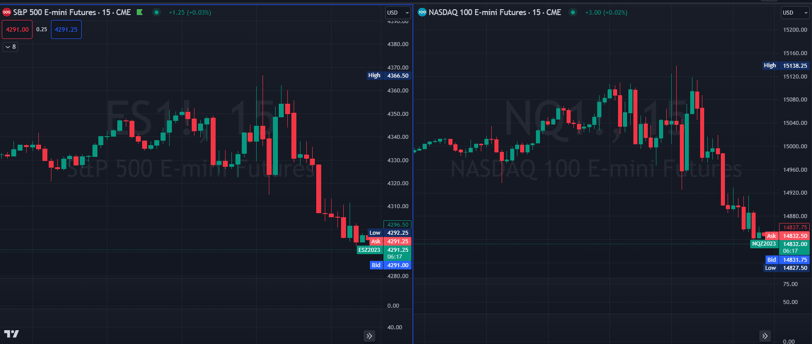Market Review 19th October 2023
Simplify the craziness
DAILY REVIEW
N
3 min read
In today's trading news, oil prices experienced a sharp increase, reaching over $90 a barrel, as tensions escalated in the Middle East. Meanwhile, Wall Street is on edge as the anniversary of "Black Monday" approaches, with some traders speculating about a possible market crash. This article provides a detailed summary of the day's most significant trading-related news, offering insights from both an expert derivatives trader and a digital marketing specialist.
Oil Prices Soar Amid Middle East Tensions
Oil prices surged on Thursday, propelled by mounting tensions in the Middle East. The primary factors contributing to this price hike are as follows:
U.S. Navy Intercepting Missiles: Reports emerged of a U.S. Navy warship intercepting multiple missiles near Yemen. A Pentagon spokesperson disclosed that a Navy destroyer intercepted three missiles and several drones launched by Houthi forces in Yemen, although their intended target remains unknown.
U.S. Energy Department's Strategic Petroleum Reserve: The U.S. Energy Department announced plans to purchase oil for its Strategic Petroleum Reserve through at least May 2024. The first request seeks up to 6 million barrels of oil for delivery in December and January, with a target price of $79 per barrel.
Current Prices: In electronic trading, the November West Texas Intermediate crude contract was at $90.68, up from the $89.37 Nymex settlement. The December Brent crude also saw an increase, reaching $93.25 from $92.38 at Thursday's settlement.
Wall Street Reminisces 'Black Monday'
As the anniversary of "Black Monday" approaches, traders on Wall Street are revisiting historical market crashes and speculating on the possibility of a similar event occurring. There is a notable increase in the sharing of ominous-looking charts and comparisons between the stock market's recent performance and the events of 1987.
Nasdaq and Dow Parallels: Some traders have observed similarities between the Nasdaq's behavior in 2023 and the Dow's performance in 1987. This pattern is also mirrored in Treasury yields.
Market Differences: Analysts emphasize significant differences between the markets in 1987 and today, such as the stronger circuit-breaker mechanisms in place to prevent extreme index declines in a single session.
Market Skepticism: While there is growing concern about echoes of 1987, skeptics argue that the economic and market conditions differ significantly from those leading up to the 1987 crash.
The anticipation of the anniversary of "Black Monday," when the Dow Jones Industrial Average plummeted 508 points in a single day, has contributed to market uncertainty. While there is a debate regarding the possibility of a market crash, some analysts suggest that certain high-level similarities do not necessarily point to an impending crash-like event.
Jerome Powell's Influence on the Markets
Federal Reserve Chairman Jerome Powell's remarks have a considerable impact on the markets, and traders are closely watching his speeches. Some key points include:
Economic Data and Financial Conditions: The economy's performance has been strong, but financial conditions are also essential. The Federal Reserve is cautious and assesses the overall market situation rather than reacting to individual data points.
The Bond Market: There is speculation about how the bond market might react in the event of a stock market rout. Historical data indicates that bonds can experience a flight-to-safety rally during market declines.
Market Movement and Earnings Reports
Earnings reports from major companies have also influenced market movements today. Notable developments include:
Tesla: Tesla reported lower-than-expected earnings and offered a cautious outlook, causing its stock to decline.
Netflix: Netflix exceeded earnings expectations and experienced a significant surge in subscribers, leading to a notable increase in its stock price.
AT&T: AT&T reported earnings and revenue that surpassed analysts' estimates and raised its free cash flow outlook.
Union Pacific: Union Pacific posted better-than-expected profit, leading to an increase in its stock value.
Nokia: Nokia announced plans to cut up to 14,000 jobs after a decline in profit, which caused its shares to drop.
Conclusion
Today's trading news has been dominated by a surge in oil prices due to Middle East tensions and increased speculation surrounding the anniversary of "Black Monday." Wall Street continues to be influenced by earnings reports and the Federal Reserve's stance, making it essential for traders to stay vigilant and adapt to the evolving market conditions.


